牛津高中英语M3U2 Reading English and its history Language Points
- 格式:ppt
- 大小:570.00 KB
- 文档页数:31
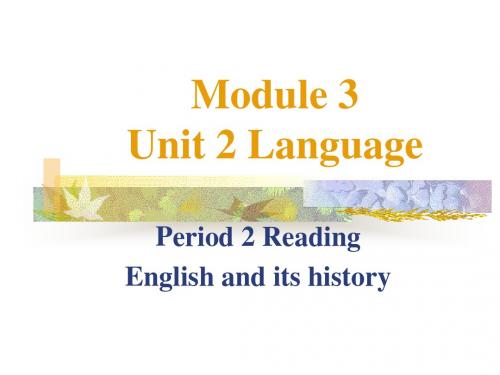
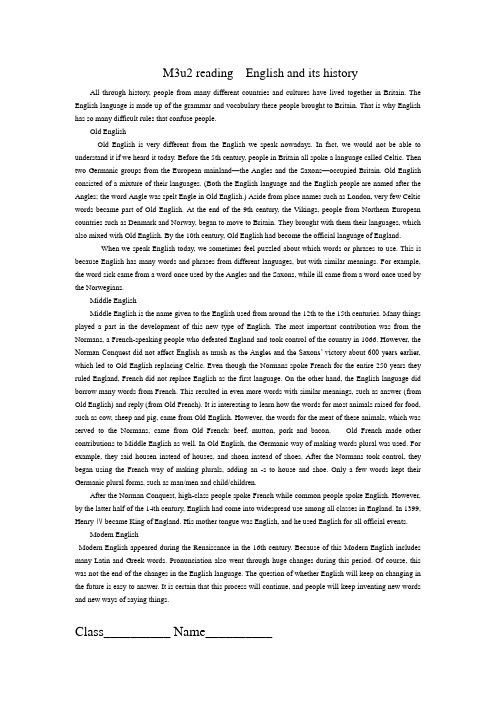
M3u2 reading English and its history All through history, people from many different countries and cultures have lived together in Britain. The English language is made up of the grammar and vocabulary these people brought to Britain. That is why English has so many difficult rules that confuse people.Old EnglishOld English is very different from the English we speak nowadays. In fact, we would not be able to understand it if we heard it today. Before the 5th century, people in Britain all spoke a language called Celtic. Then two Germanic groups from the European mainland—the Angles and the Saxons—occupied Britain. Old English consisted of a mixture of their languages. (Both the English language and the English people are named after the Angles; the word Angle was spelt Engle in Old English.) Aside from place names such as London, very few Celtic words became part of Old English. At the end of the 9th century, the Vikings, people from Northern European countries such as Denmark and Norway, began to move to Britain. They brought with them their languages, which also mixed with Old English. By the 10th century, Old English had become the official language of England.When we speak English today, we sometimes feel puzzled about which words or phrases to use. This is because English has many words and phrases from different languages, but with similar meanings. For example, the word sick came from a word once used by the Angles and the Saxons, while ill came from a word once used by the Norwegians.Middle EnglishMiddle English is the name given to the English used from around the 12th to the 15th centuries. Many things played a part in the development of this new type of English. The most important contribution was from the Normans, a French-speaking people who defeated England and took control of the country in 1066. However, the Norman Conquest did not affect English as mush as the Angles and the Saxons’ victory about 600 years earlier, which led to Old English replacing Celtic. Even though the Normans spoke French for the entire 250 years they ruled England, French did not replace English as the first language. On the other hand, the English language did borrow many words from French. This resulted in even more words with similar meanings, such as answer (from Old English) and reply (from Old French). It is interesting to learn how the words for most animals raised for food, such as cow, sheep and pig, came from Old English. However, the words for the meat of these animals, which was served to the Normans, came from Old French: beef, mutton, pork and bacon. Old French made other contributions to Middle English as well. In Old English, the Germanic way of making words plural was used. For example, they said housen instead of houses, and shoen instead of shoes. After the Normans took control, they began using the French way of making plurals, adding an -s to house and shoe. Only a few words kept their Germanic plural forms, such as man/men and child/children.After the Norman Conquest, high-class people spoke French while common people spoke English. However, by the latter half of the 14th century, English had come into widespread use among all classes in England. In 1399, Henry Ⅳ became King of England. His mother tongue was English, and he used English for all official events.Modern EnglishModern English appeared during the Renaissance in the 16th century. Because of this Modern English includes many Latin and Greek words. Pronunciation also went through huge changes during this period. Of course, this was not the end of the changes in the English language. The question of whether English will keep on changing in the future is easy to answer. It is certain that this process will continue, and people will keep inventing new words and new ways of saying things.Class__________ Name__________M3U2 Reading English and its history(1)All_________ history, people from many different countries and cultures have lived together in Britain. The English language ______________________________ these people brought to Britain. That is ________ English has so many difficult rules that ______________ people.Old EnglishOld English is very________________ the English we speak nowadays. ______, we would not be able to understand it if we heard it today. Before the 5th century, people in Britain all spoke a language _________ Celtic. Then two __________ groups from the European mainland—the Angles and the Saxons—_________ Britain. Old English ____________________________________. (Both the English language and the English people _______________________ the Angles; the word Angle was spelt Engle in Old English.) ________________ place names such as London, very few Celtic words became part of Old English. At the end of the 9th century, the Vikings, people from Northern European countries such as Denmark and Norway, began to move to Britain. They brought with them their languages, which also mixed with Old English. ______ the 10th century, Old English _________________ the ___________________ of England.When we speak English today, we sometimes____________________________. This is because English has many words and ____________ from different languages, but with __________ meanings. For example, the word sick came from a word once used by the Angles and the Saxons, _____________ ill came from a word once used by the Norwegians.Class___________ Name________M3U2 Reading English and its history(2)Middle EnglishMiddle English is the name given to the English used from around the 12th to the 15th centuries. Many things __________________________________________________________. The most important _______________ was from the Normans, a _____________ people who ____________________________________________ in 1066. However, the Norman _______did not ________________________________________________________ about 600 years earlier, ___________________________________________. _______________ the Normans spoke French for the _____________ 250 years they _________ England, French did not ______ English as the first language. ________________________, the English language did borrow many words from French. This _______________ even more words with similar meanings, such as answer (from Old English) and reply (from Old French). It is interesting to learn how the words for most animals ___________ for food, such as cow, sheep and pig, came from Old English. However, the words for the meat of these animals, which was _______________ the Normans, came from Old French: beef, mutton, pork and bacon.Old French ________________________________ Middle English _________. In Old English, the Germanic way of ________________________ was used. For example, they said housen instead of houses, and shoen instead of shoes. After the Normans_________________, they began using the French way of __________________, adding an -s to house and shoe. Only a few words kept their Germanic plural forms, such as man/men and child/children.After the Norman _____________, _______________ people spoke French _________ common people spoke English. However,_________________________________, English had _____________________________________________ in England. In 1399, Henry Ⅳbecame King of England. His ________________ was English, and he used English for all ______ events.Modern EnglishModern English appeared during the Renaissance in the 16th century. Because of this, Modern English __________________ many Latin and Greek words. _________________ also _________________________________ during this period. Of course, this was not the end of the changes in the English language. The question of _______________________________________. It is ___________ that this __________ will continue, and people will keep______________new words and new ways of saying things.。
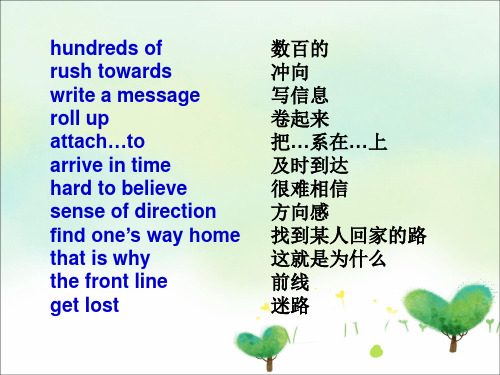
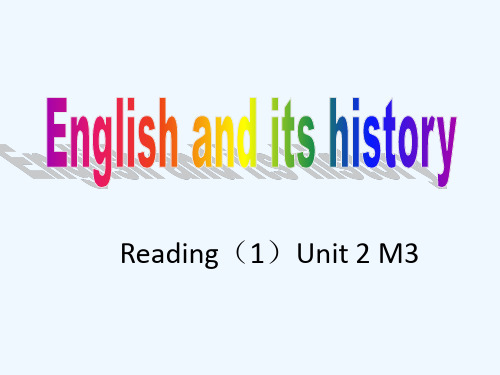
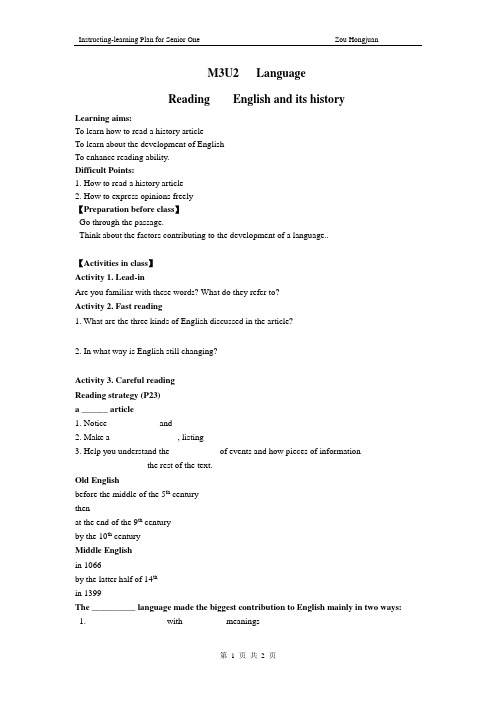
M3U2 LanguageReading English and its historyLearning aims:To learn how to read a history articleTo learn about the development of EnglishTo enhance reading ability.Difficult Points:1. How to read a history article2. How to express opinions freely【Preparation before class】Go through the passage.Think about the factors contributing to the development of a language..【Activities in class】Activity 1. Lead-inAre you familiar with these words? What do they refer to?Activity 2. Fast reading1. What are the three kinds of English discussed in the article?_________________________________________________2. In what way is English still changing?_________________________________________________Activity 3. Careful readingReading strategy (P23)a ______ article1. Notice ___________ and __________2. Make a _______________, listing ___________________3. Help you understand the ___________of events and how pieces of information________________ the rest of the text.Old Englishbefore the middle of the 5th century________________________________________then _____________________________________________at the end of the 9th century ______________________________________________by the 10th century ______________________________________________ Middle Englishin 1066 ______________________________________________by the latter half of 14th______________________________________________in 1399 ______________________________________________ The __________ language made the biggest contribution to English mainly in two ways: 1. ________ _________ with _________ meaningsExamples: Words for animals______________________________ Words for their meat ______________________________ 2. Way of _______ _______ ________Examples: Germanic way _____________________________French way _____________________________Modern English1.When did Modern English appear?________________________________________2.What also changed a lot in Modern English?________________________________________Activity4. Task-based readingEnglish and its historyOld EnglishBefore the middle of the 5th century, the language 1________in Britain was Celtic. Then Britain was 2____________ by the Angles and the Saxons, who brought their language into Old English.At the end of the 9th century, the Vikings moved to Britain, 3_________ their languages with Old English.By the 10th century, Old English, had become the 4__________ language of England.Middle EnglishIn 1066, England was 5__________ by the Normans, but French didn’t6___________ English as the first language.By the latter half of the 14th century, English had been 7________used among all classes in England.Modern EnglishV ocabulary and pronunciation also went 8_________ great changes during the Renaissance. It is 9________ that English will continue 10___________ in the future.Activity5. DiscussionWhat are the main reasons for the development of a language?Activity 6. InterviewSuppose a Chinese linguistic expert (汉语言专家)comes to our school, interview this expert. You can include the following points in your interview:语言发展变化的原因;近年来汉语发展变化的原因;网络语言(cyber language)的影响;汉语是否有可能取代英语成为最广泛使用的语言。
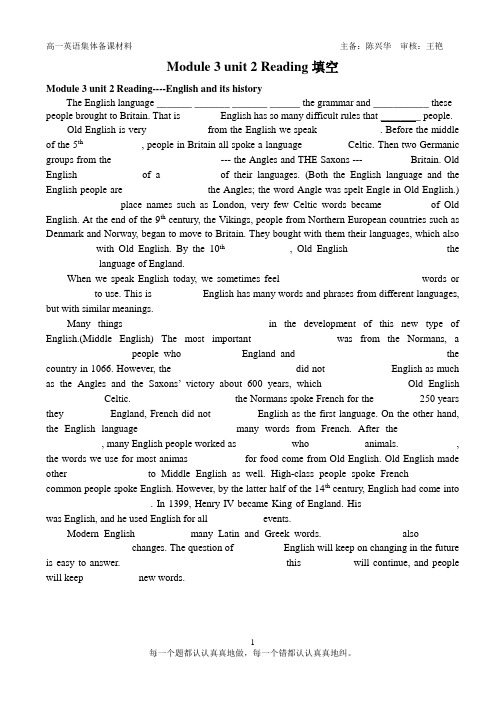
Module 3 unit 2 Reading填空Module 3 unit 2 Reading----English and its historyThe English language _______ _______ _______ ______ the grammar and ___________ these people brought to Britain. That is _______ English has so many difficult rules that ________ people.Old English is very ___________ from the English we speak ____________. Before the middle of the 5th ___________, people in Britain all spoke a language ________ Celtic. Then two Germanic groups from the ___________ _________ --- the Angles and THE Saxons ---_________ Britain. Old English ___________ of a __________ of their languages. (Both the English language and the English people are ________ _______ the Angles; the word Angle was spelt Engle in Old English.) _______ ______ place names such as London, very few Celtic words became ________ of Old English. At the end of the 9th century, the Vikings, people from Northern European countries such as Denmark and Norway, began to move to Britain. They bought with them their languages, which also _________ with Old English. By the 10th____________, Old English ________ _________ the __________ language of England.When we speak English today, we sometimes feel _________ ________ ________ words or _________ to use. This is _________ English has many words and phrases from different languages, but with similar meanings.Many things _________ _______ _______ in the development of this new type of English.(Middle English) The most important ______________ was from the Normans, a ________________ people who __________ England and _________ _________ ________ the country in 1066. However, the ___________ ____________ did not ____________ English as much as the Angles and the Saxons’victory about 600 years, which _______ _______ Old English ___________ Celtic. _________ __________ the Normans spoke French for the ________ 250 years they ________ England, French did not ________ English as the first language. On the other hand, the English language _______ _________ many words from French. After the ___________ ___________, many English people worked as __________ who __________ animals. ___________, the words we use for most animas __________ for food come from Old English. Old English made other ______________ to Middle English as well. High-class people spoke French _________ common people spoke English. However, by the latter half of the 14th century, English had come into _____________ _______. In 1399, Henry IV became King of England. His _________ _________ was English, and he used English for all __________ events.Modern English _________ many Latin and Greek words. ______________ also _______ _______ _________ changes. The question of _________ English will keep on changing in the future is easy to answer. _______ _______ ________ ________this _________ will continue, and people will keep __________ new words.Module 3 unit 2 Project填空Module 3 unit 2 ProjectThe development of Chinese charactersThe Chinese language ________ ________ Western languages _______ _______ instead of an __________, it uses ___________ which ________ ________ ideas, objects or ________. Chinese words are _________ by putting together different ____________. In many cases, a single character can also ________ ________ a word.According to an ancient story, a man ________ Cang Jie ________ Chinese writing. One winter day while he was ___________, he saw the _________ of animals in the snow and __________ that the ___________ of each one was different. Then he had the idea _________ he could use different shapes to _____________ different objects. Some characters have been ____________ and ________ have been made more difficult ________ time. However, ______ ______ __________, the characters have developed from drawings into ___________ __________.Not all ____________ were developed from drawings of objects. Sometimes to __________ ideas, some characters were made by _____________ two or more characters together. The character ‘prisoner’ was _________ with a ‘man’ inside a square. It is easy to ____________ their meanings by looking at them, for example, the characters for ‘up’ and ‘down’, which are __________ of each other. Though these kinds of characters ____________ meanings, one of their ______________ is that they do not show how they should be ______________.In the 1950s the Chinese government _____________ ____________ Chinese characters and now they have ____________ use in China’s ____________.The story of BrailleWhen we talk about reading, we think of using our eyes to see letters written _______ _______. The man who _____________ blind people to __________ was Louis Braille(1809-1852). Braille ________ his __________ at the age of three as a result of an_________. In those days, books for blind people used paper __________ __________ metal wire to form letters. _________ the metal wire was heavy, each book ___________ as much as 100 pounds. The whole _____________ was not ______________ for use.His system used paper with small, _________ dots that could be felt with the fingers. Each letter of the ___________ was _____________ by a different pattern which ___________ ________ twelve dots. The soldiers would ___________ their fingers over the _________ dots to read the message. ________ the students found the soldiers idea interesting, the ___________ was too difficult _______ ________ ________ _________ use.Nearly every language, ____________ Chinese, has its own ___________ of Braille for its people to use.Module 3 unit 2 课文填空Module 3 unit 2 Reading----English and its historyThe English language is made up of the grammar and vocabulary these people brought to Britain. That is why English has so many difficult rules that confused people.Old English is very different from the English we speak nowadays. Before the middle of the 5th century, people in Britain all spoke a language called Celtic. Then two Germanic groups from the European mainland --- the Angles and THE Saxons ---occupied Britain. Old English consisted of a mixture of their languages. (Both the English language and the English people are named after the Angles; the word Angle was spelt Engle in Old English.) Aside from place names such as London, very few Celtic words became part of Old English. At the end of the 9th century, the Vikings, people from Northern European countries such as Denmark and Norway, began to move to Britain. They bought with them their languages, which also mixed with Old English. By the 10th century, Old English had become the official language of England.When we speak English today, we sometimes feel confused/puzzled about which words or phrases to use. This is why English has many words and phrases from different languages, but with similar meanings.Many things played a role in the development of this new type of English.(Middle English) The most important contribution was from the Normans, a French-speaking people who defeated England and took control of the country in 1066. However, the Norman Conquest did not affect English as much as the Angles and the Saxons’ victory about 600 years, which lead to Old English replacing Celtic. Even though the Normans spoke French for the entire 250 years they ruled England, French did not replace English as the first language. On the other hand, the English language did borrow many words from French. After the Norman Conquest, many English people worked as servants who raised animals. Therefore, the words we use for most animas raised for food come from Old English. Old English made other contributions to Middle English as well. High-class people spoke French while common people spoke English. However, by the latter half of the 14th century, English had come into widespread use. In 1399, Henry IV became King of England. His mother tongue was English, and he used English for all official events.Modern English includes many Latin and Greek words. Pronunciation also went through huge changes. The question of whether English will keep on changing in the future is easy to answer. It is certain that this process will continue, and people will keep inventing new words.Module 3 unit 2 ProjectThe development of Chinese charactersThe Chinese language differs from Western languages in that instead of an alphabet, it uses characters which stand for ideas, objects or deeds. Chinese words are formed by putting together different characters. In many cases, a single character can also make up a word.According to an ancient story, a man named Cang Jie invented Chinese writing. One winter day while he was hunting, he saw the tracks of animals in the snow and observed that the appearance of each one was different. Then he had the idea that he could use different shapes to represent different objects. Some characters have been simplified and others have been made more difficult over time. However, as a whole, the characters have developed from drawings into standard form.Not all characters were developed from drawings of objects. Sometimes to express ideas, some characters were made by combining two or more characters together. The character ‘prisoner’ was formed with a ‘man’ inside a square. It is easy to distinguish their meanings by looking at them, for example, the characters for ‘up’ and ‘down’, which are opposites of each other. Though these kinds of characters indicate meanings, one of their shortcomings is that they do not show how they should be pronounced.In the 1950s the Chinese government introduced simplified(形容词“被简化的”)Chinese characters and now they have widespread use in China’s mainland.The story of BrailleWhen we talk about reading, we think of using our eyes to see letters written in ink. The man who introduced(使…了解)blind people to(介词) reading was Louis Braille(1809-1852). Braille lost his eyesight at the age of three as a result of an injury. In those days, books for blind people used paper pressed against metal wire to form letters. Since(因为) the metal wire was heavy, each book weighed as much as 100 pounds. The whole system was not convenient for use.His system used paper with small, raised dots that could be felt with the fingers. Each letter of the alphabet was represented by a different pattern which consisted of twelve dots. The soldiers would drag their fingers over the raised dots to read the message. While(尽管) the students found the soldiers idea interesting, the system was too difficult to be of practical use.Nearly every language, including Chinese, has its own version of Braille for its people to use.。
M3U2 Reading English and its historyLanguage points 一.Important phrases1. occupy 占领(地方、时间、思想、房屋、土地等); 担任职务①The army __________________________________ (占领了敌人的首都).occupy sb/ oneselfin doing sthwith sth⎧⎨⎩be occupiedin doing sthwith sth⎧⎨⎩忙于做某事②She occupied herself with routine office tasks.---She __________________________________ routine office tasks.(被动语态)n. occupation 职业、占用adj. occupied使用中,占领的Practice:1.He with an English story so that he didn’t hear someone come in.A. was occupied himselfB. occupied himselfC. occupied to himselfD. occupied2. The table is already occupied. ______________________.(译成中文)2.conquer 占领,征服The city was conquered overnight. 那座城市在夜里被占领了。
conquest n .征服3.defeat v. n.比较:defeat / beat/ windefeat的宾语常是敌人,在游戏或比赛中击败对手则用beat,二者可以互用,win表示在较强的竞争中取得了胜利,宾语多是game, match, race 等,常用win sb sth.①The Americans the British in 1781.②We their team by 10 points.③Hard work him the first prize in the music competition.二.Difficult sentences1. That is why English is a language with so many confusing rules.⑴Tha’s why 引导的是表语从句。